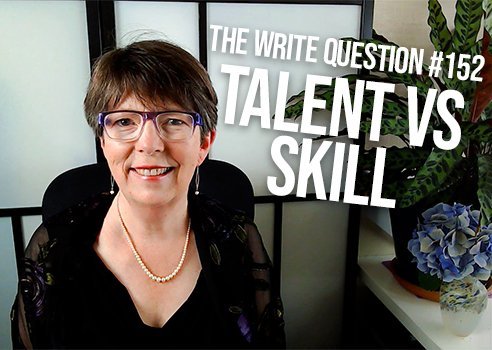Viewing time: 4 mins 9 secs
The Write Question is a weekly video podcast about writing that I started in 2017 and that ran, more or less weekly, until April 2022. This is a republication of issue #152, which asks: is writing a talent or a skill? The post first ran on Aug. 21/20.
Transcript:
Is writing a talent or a skill? That’s the topic I’m addressing today in The Write Question. I’m Daphne Gray-Grant, the Publication Coach, still in pandemic mode.
I have a question from Kasra Ghorbani, a student based in Isfahan, Iran. Here’s what he’s asked by email….
“Is writing an accumulated skill or a talent? What do you believe?”
Thanks for your question, Kasra. When I was a child growing up in Canada, there was a product called Certs — a type of mint. The company ran a series of famous TV commercials (Mel: can you include a still from the video in the top right-hand of the screen?) in which two models argued whether the product was a “breath mint” or a “candy mint”. I include a link to one commercial in the show notes.
If you listen to this recording, you’ll hear the announcer intone, “certs is two, two, two mints in one.” I must have heard that expression a million times in my TV-saturated childhood.
Your question about whether writing is a talent or a skill made me think of that certs commercial. Just like the mints, writing has two, two, two characteristics in one!
But if you asked me to pick the more important, I’d definitely select hard work. Why? Because talent doesn’t get you very far if you don’t put any work into it.
I’ve known many talented people in my life. Some of them have made great achievements; others in this group have done almost nothing. The bottom line is, talent is no guarantee of success.
Almost everything that matters in this world is a skill. If it’s something you can learn to do — and writing clearly falls into that category — it’s a skill.
But, at the same time, researchers David Hambrick and Elizabeth Meinz have disproven the myth that talent doesn’t matter. In a paper published by the Association for Psychologic Science — see link in the show notes below — they present a chart showing the evidence.
The vertical axis displays your level of performance, otherwise known as your hard work. Higher up means really hard work. The horizontal axis — at the bottom — shows your innate talent. The red line represents those who have put in the hours while the blue shows those with lots of talent who haven’t made much effort.
As you can see, people shown in the red are doing better. But people in the blue have a steeper curve to their line. This means they’ll be able to get ahead more quickly — if — and this is an essential “if” — if they put in the work.
Of course, talented people are going to find it easier to learn and practice the skills associated with writing. But how many of them are actually going to do it? Learning and improving is hard work.
What this means is that those of us with more modest abilities and talents still have a chance. We can often outperform those with more talent as long as we’re willing to work harder.
To me this means that writing is a matter of both skill and talent, with the former being more important.
Finally, let me wrap up with a quote from American writer Stephen King. “Talent is cheaper than table salt. What separates the talented individual from the successful one is a lot of hard work.”
Kasra, people with exceptional talent are rare AND so are people who are willing to work exceptionally hard. If you want to be a successful writer, even if you weren’t born with a lick of talent, hard work can help you achieve that goal.
*
If you’d like to learn more about how to make writing a happier and more rewarding process, check out my latest book Your Happy First Draft. I don’t sell it in bookstores or via Amazon. The only place to buy it is on my website, link on the screen below and in the show notes.
Links
Paper in the Association For Psychological Science by David Hambrick & Elizabeth Meinz


